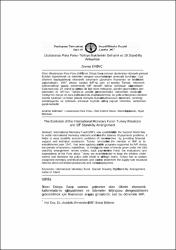| dc.contributor.author | Erdinç, Zeynep | |
| dc.date.accessioned | 2019-10-20T21:12:53Z | |
| dc.date.available | 2019-10-20T21:12:53Z | |
| dc.date.issued | 2007 | |
| dc.identifier.issn | 1302-1842 | |
| dc.identifier.uri | http://www.trdizin.gov.tr/publication/paper/detail/TmprM056azU= | |
| dc.identifier.uri | https://hdl.handle.net/11421/19144 | |
| dc.description.abstract | Uluslararası Para Fonu (IMF), İkinci Dünya Savaşı sonrası uluslararası düzeyde parasal ilişkileri düzenlemek ve ödemeler dengesi sorunlarını çözmek amacıyla kurulmuştur. Üye ülkelerin karşılaşabileceği ekonomik sorunların çözümüne finansman ve teknik destek sağlamaktadır. 1947 yılında kurulan IMF’na aynı yıl üye olan Türkiye, ekonomik istikrarsızlıklar yaşadığı dönemlerde IMF destekli istikrar politikaları uygulamaktadır. Çalışmamızda, 19. stand-by anlaşması ile ilgili niyet mektupları, gözden geçirmeler, borç geri ödemeleri ve IMF’nun Türkiye’ye yönelik değerlendirmeleri, beklentileri incelenmiştir. Türkiye’nin maliye ve para politikalarında disiplini sürdürmesi, bu yolla enflasyonun denetim altında tutulması ve halen yüksek düzeyde bulunan kamu borcunun düşürülmesi, verimliliği destekleyecek ve istihdamı arttıracak biçimde arz yönlü yapısal reformları sürdürmesi gerekmektedir. | en_US |
| dc.description.abstract | International Monetary Fund (IMF), was established after the Second World War to settle international monetary relations and to solve the balance of payments problems. It helps to ease possible economic problems of member countries by providing financial support and technical assistance. Turkey, which became the member of IMF at its establishment year 1947, has been applying stabilization programs supported by IMF during the periods of economic instabilities. In this study, the letter of intents given under the 19th stand-by arrangement, review unders, back payments to the Fund, the evaluations and expectations of the Fund about Turkey are examined. In order to keep the inflation under control and decrease the public debt which is still at high levels, Turkey has to sustain disciplined monetary and fiscal policies and continue to implement the supply side structural reforms which will bolster productivity and increase employment. | en_US |
| dc.language.iso | tur | en_US |
| dc.rights | info:eu-repo/semantics/openAccess | en_US |
| dc.subject | Sosyal Bilimler | en_US |
| dc.subject | Disiplinler Arası | en_US |
| dc.title | Uluslararası Para Fonu-Türkiye İlişkilerinin Gelişimi ve 19. Stand-By Anlaşması | en_US |
| dc.title.alternative | The Evolution of the International Monetary Fund-Turkey Relations and 19th Stand-By Arrangement | en_US |
| dc.type | article | en_US |
| dc.relation.journal | Dumlupınar Üniversitesi Sosyal Bilimler Dergisi | en_US |
| dc.contributor.department | Anadolu Üniversitesi, İktisadi ve İdari Bilimler Fakültesi, İktisat Bölümü | en_US |
| dc.identifier.volume | 0 | en_US |
| dc.identifier.issue | 18 | en_US |
| dc.identifier.startpage | 99 | en_US |
| dc.identifier.endpage | 116 | en_US |
| dc.relation.publicationcategory | Makale - Ulusal Hakemli Dergi - Kurum Öğretim Elemanı | en_US] |


















